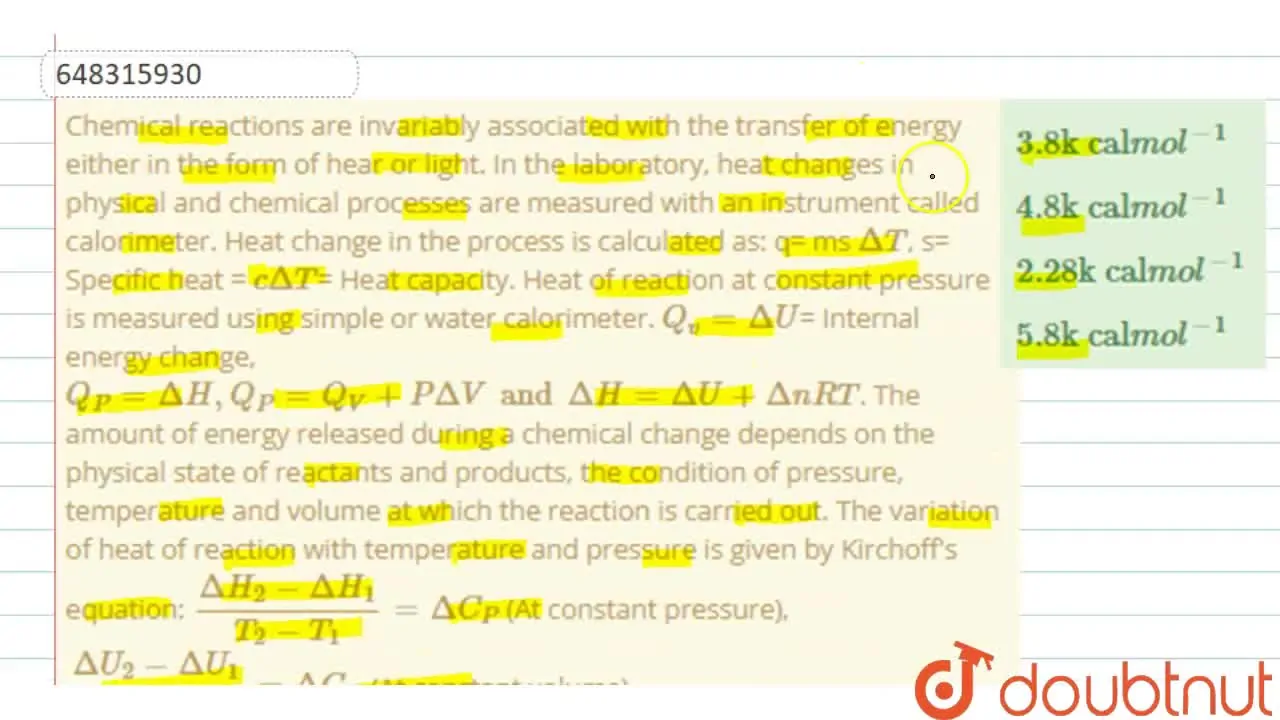Chemical reactions are invariably associated with the transfer of energy either in the form of hear or light. In the laboratory, heat changes in physical and chemical processes are measured with an instrument called calorimeter. Heat change in the process is calculated as: q= ms , s= Specific heat = = Heat capacity. Heat of reaction at constant pressure is measured using simple or water calorimeter. = Internal energy change, . The amount of energy released during a chemical change depends on the physical state of reactants and products, the condition of pressure, temperature and volume at which the reaction is carried out. The variation of heat of reaction with temperature and pressure is given by Kirchoff's equation: (At constant pressure), (At constant volume)
The specific heat of in vapoour and solid state are 0.031 and 0.055 cal/g respectively. The heat of sublimation of iodine at is 6.096 kcal . The heat of sublimation of iodine at will be
The correct Answer is:D
Step by step video & image solution for Chemical reactions are invariably associated with the transfer of energy either in the form of hear or light. In the laboratory, heat changes in physical and chemical processes are measured with an instrument called calorimeter. Heat change in the process is calculated as: q= ms Delta T, s= Specific heat = c Delta T= Heat capacity. Heat of reaction at constant pressure is measured using simple or water calorimeter. Q_(v)= Delta U= Internal energy change, Q_(P) = DeltaH, Q_(P) = Q_(V) + P Delta V and DeltaH = Delta U+ Delta nRT. The amount of energy released during a chemical change depends on the physical state of reactants and products, the condition of pressure, temperature and volume at which the reaction is carried out. The variation of heat of reaction with temperature and pressure is given by Kirchoff's equation: (DeltaH_(2) - DeltaH_(1))/(T_(2)-T_(1))= Delta C_(P) (At constant pressure), (DeltaU_(2) - DeltaU_(1))/(T_(2)-T_(1)) = DeltaC_(V) (At constant volume) The specific heat of I_(2) in vapoour and solid state are 0.031 and 0.055 cal/g respectively. The heat of sublimation of iodine at 200^(@)C is 6.096 kcal mol^(-1). The heat of sublimation of iodine at 250^(0)C will be by Chemistry experts to help you in doubts & scoring excellent marks in Class 12 exams.
Similar Questions
Chemical reactions are invariably associated with the transfer of energy either in the form of hear or light. In the laboratory, heat changes in physical and chemical processes are measured with an instrument called calorimeter. Heat change in the process is calculated as: q= ms ΔT, s= Specific heat = cΔT= Heat capacity. Heat of reaction at constant pressure is measured using simple or water calorimeter. Qv=ΔU= Internal energy change, QP=ΔH,QP=QV+PΔVandΔH=ΔU+ΔnRT. The amount of energy released during a chemical change depends on the physical state of reactants and products, the condition of pressure, temperature and volume at which the reaction is carried out. The variation of heat of reaction with temperature and pressure is given by Kirchoff's equation: ΔH2−ΔH1T2−T1=ΔCP (At constant pressure), ΔU2−ΔU1T2−T1=ΔCV (At constant volume)
The enthalpy change (ΔH) for the reaction N2(g)+3H2(g)→2NH3(g) is −92.38kJ at 298 K. The internal energy change ΔU at 298 K isView SolutionHeat of reaction at constant pressure is………….. .
View SolutionChemical reactions are invariably assocated with the transfer of energy either in the form of heat or light. In the laboratory, heat changes in physical and chemical processes are measured with an instrument called calorimeter. Heat change in the process is calculated as: q= ms ΔT, s= specific heat = cΔT, c= heat capacity
Heat of reaction at constant volume is measured using bomb calorimeter. qv=ΔU= internal energy change.
Heat of reaction at constant pressure is measured using simple or water calorimeter. qp=ΔH,qp=qv+PΔV,ΔH=ΔU+ΔnRT
The amount of energy released during a chemical change depnds on the physical state of reactants and products, the condition of pressure, temperature and volume at which the reaction is carried out. The variation of heat of reaction with temperature and pressure is given by Kirchhoff's equation: ΔH2−ΔH1⊤2−T1=ΔCP (At constant pressure), ΔU2−ΔU1⊤2−T1=ΔCV (At constant volume)
The heat capacity of bomb calorimeter (with its contents) is 500J/K. When 0.1g of CH4 was burnt in this calorimeter the temperature rose by 2∘C. The value of ΔU per mole will beView SolutionChemical reactions are invariably associated with the transfter of energy either in the form of heat or light. In the laboratory, heat changes in physical and chemical processes are measured with an instrument called calorimeter. Heat change in the process is calculated as
q=msΔTs=Specific heat=cΔTc=Heat capacity
Heat of reaction at constant volume is measured using bomb calorimeter.
qV=ΔU= Internal energy change
Heat of reaction at constant pressure is measured using simple or water calorimeter.
qp=ΔH
qp=qV+PΔV
ΔH=ΔU+ΔnRT
The heat capacity of a bomb calorimeter is 500JK−1. When 0.1g of methane was burnt in this calorimeter, the temperature rose by 2∘C. The value of ΔU per mole will beView SolutionChemical reactions are invariably associated with the transfter of energy either in the form of heat or light. In the laboratory, heat changes in physical and chemical processes are measured with an instrument called calorimeter. Heat change in the process is calculated as
q=msΔTs=Specific heat=cΔTc=Heat capacity
Heat of reaction at constant volume is measured using bomb calorimeter.
qV=ΔU= Internal energy change
Heat of reaction at constant pressure is measured using simple or water calorimeter.
qp=ΔH
qp=qV+PΔV
ΔH=ΔU+ΔnRT
The enthalpy of fusion of ice is 6.02kJmol−1. The heat capacity of water is 4.18Jg−1C−1. What is the smallest number of ice cubes at 0∘C, each containing one molw of water, the are needed to cool 500g of liquid water from 20∘C→0∘C?View SolutionExplain the change of heat energy in a physical change.
View SolutionSpecific heat capacity of water is
View SolutionThe heat capacity at constant pressure is related to heat capacity at constant volume by the relation
View SolutionChemical reactions in which heat energy is evolved are called
View SolutionThe specific heat capacity of water is :
View Solution


